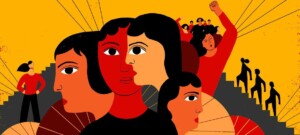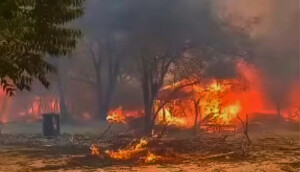Protests after farmers are murdered in South Darfur
Four farmers and a herder were killed in Mershing, South Darfur two days ago, on Wednesday. In response, the area witnessed widespread protests, road closure, and calls for a further sit-in to protest the events.
 A displaced woman at Kalma camp, South Darfur, where many farmers fled to during the war and genocide in Darfur (Albert González Farran/UNAMID)
A displaced woman at Kalma camp, South Darfur, where many farmers fled to during the war and genocide in Darfur (Albert González Farran/UNAMID)
Four farmers and a herder were killed in Mershing, South Darfur two days ago, on Wednesday. In response, the area witnessed widespread protests, road closure, and calls for a further sit-in to protest the events.
Witnesses from the area told Radio Dabanga that gunmen in a pick-up truck opened fire at farmers who were on their donkeys on their way from Manawashi to Amarjadeed, about two kilometres away, on Wednesday evening.
Abdallah Abdelrahman (40), Shafee Adam (40), and Adam Abd El Mawli (25) were killed on the spot and their bodies were transferred to the Nyala mortuary for autopsy. They were buried in Manawashi on Thursday.
The sources explained that the attack was the result of a violent incident in the vicinity of Abu Hamra on Wednesday morning, when herders released their cattle on several farms in the area. This led to clashes between the herders and farmers, in which a farmer and a herder were killed.
They said the farmers delivered the cattle to the garrison in Manawashi.
The garrison returned the cattle to the herders, and in the meantime, armed men related to the killed herder shot at the farmers on the Manawashi-Amarjadeed, killing the three men.
Manawashi in Mershing locality witnessed demonstrations against the killings yesterday. Protesters also closure of the main road between Nyala and El Fasher, the capital of North Darfur.
Darfur herders and farmers conflict
Darfur has a long history of strife between Arab herding tribes and non-Arab African herders or sedentary farmers, including the Masalit in West and South Darfur.
Arab tribesmen were recruited by the previous regime of dictator Omar Al Bashir to join the Janjaweed militias. Al Bashir employed these Arab militias to repress a revolt over ethnic marginalisation in the region, mainly targeting non-Arab African farmers.
During the war that followed, at least 300,000 people were killed and over 2.5 million were displaced according to the UN.
Violence between herders and farmers still persists in the area and authorities often fail to intervene.











 and then
and then